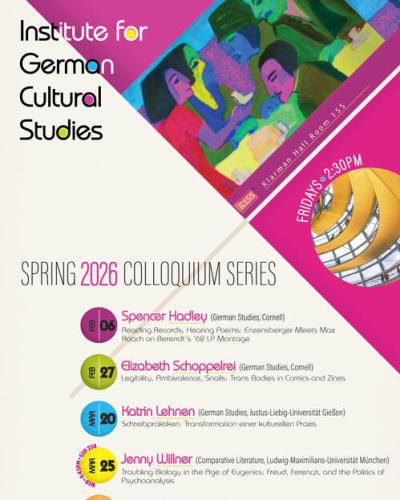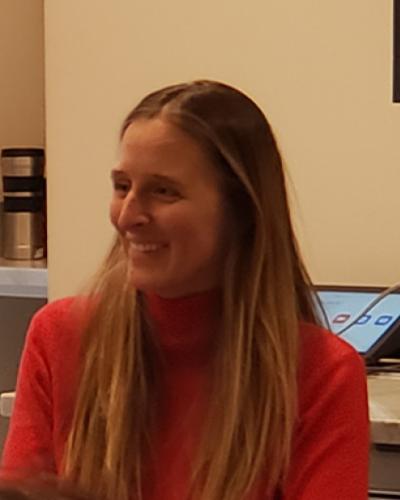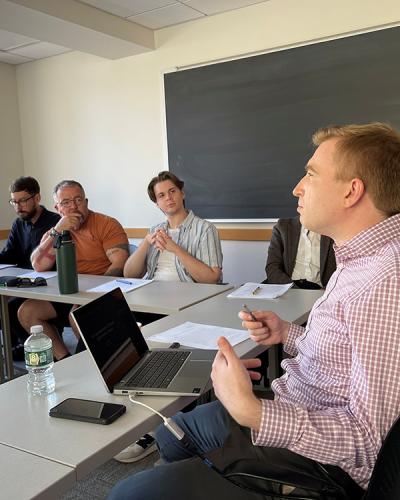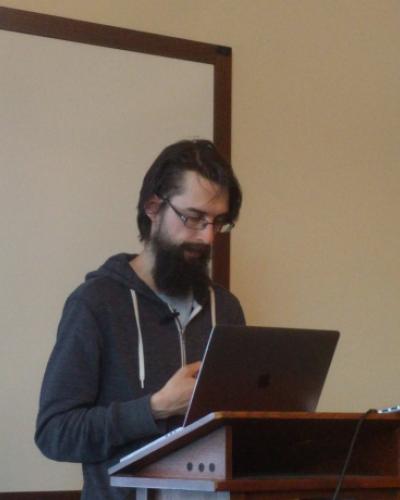Clemens J. Setz Literary Reading
April 18, 2018
In the first of three events during his time at Cornell as writer-in-residence, Clemens J. Setz gave a literary reading on April 18th. Setz is a highly acclaimed Austrian writer whose most recent publications include the novels Indigo (shortlisted for the German Book Prize in 2012), Die Stunde zwischen Frau und Gitarre (winner of the Wilhelm Raabe Prize in 2015), and Bot (2018). Setz read numerous short texts that were published for the most part in his most recent book Bot: Gespräch ohne Autor, an experimental work that was culled from his notebooks. The topics and themes of these entires vary widely, ranging from a radical re-interpretation of Rilke's famous poem “Der Panther,” to the description of a hunt in Tokyo for fish said to have been born in space, and even to the discovery of odd words that have no legitimate etymology in literary lexicons and dictionaries. Though the texts themselves were all written and read in their original German, Setz filled in the spaces between the texts with anecdotes and remarks in a mix of German and English.
Bot takes as its starting point the notion that an official interview with an author can often become stifling. When Setz was asked to participate in a book-length interview, he made it clear that a different format was needed. He decided to send the interviewer all of his journals and notes (numbering a few thousand pages) and let her find his answers to her questions by searching through the digital documents for suitable words and themes. Bot was born of Setz's fascination with Philip K. Dick’s robot “Philip” that was created after Dick’s death, and whose ''brain'' was filled with all the texts he had ever written. People would ask the robot questions and it would search around for key words. At one point the robot malfunctioned and was not able to stop speaking, but instead of stopping the event, programmers just turned the volume down when a question was asked and then turned it back up in mid-sentence to let Philip ''answer.'' This robot strongly influenced Setz’s notion of authorship. He expressed his hope that ''maybe if I write enough, people will speak to me after I die.''
During the discussion that followed, many questions circled around Setz’s idea of authorship and the relationship of an author to his/her influences, whether literary or not. Setz’s responses were filled with colorful anecdotes. In keeping with his notion of authorship, Setz claimed: ''I am not the best authority on my own influences.'' Setz also proposed an aesthetics of connectivity, when describing fungus as displaying internet-like structures and pathways. Asked whether Setz had ever attempted to introduce ''fake'' words into the German language, he said that he had not, but that he had once attempted to change the atomic weight of Cesium on its Wikipedia page, in order to see whether anyone would actually notice. After a day or two, someone did, and they changed it back. With regard to his own Wikipedia page and his biography, Setz claimed to “have no biography.” If someone were to change things on his page, it would probably go unnoticed. From this Setz drew the conclusion: ''I don't matter as much as Cesium,'' and brought the discussion to a fitting close. (Daniel Binswanger Friedman)
Clemens J. Setz: Compact Seminar
April 23, 2018
On April 23, 2018, the German Department's writer-in-residence Clemens J. Setz held a compact seminar that was dedicated to lyric poetry and especially to poems that had had a significant impact on Setz’s own mode of writing. Known primarily for his novels and other works of fiction, Setz has also published a volume of poetry. The poems that Setz chose for the seminar gave him an opportunity to demonstrate his expertise in working across different literary genres as well as his meticulous attention to detail as a reader. In his remarks, Setz focused on the materiality and creative use of language. The many texts selected for the seminar included a number of Ernst Jandl's sound poems, which were juxtaposed to poems from Jandl's lesser known contemporaries Ernst Herbeck and Edmund Mach. Setz also examined a poem written phonetically in a regional dialect by Christine Nöstlinger and some of the early writings by Werner Herzog, the famous film auteur. Setz concluded the compact seminar with a discussion of contemporary German-language twitter poets Kurt Prödel and Luni. The lively discussion focused on questions of authorship and the Austrian literary tradition as distinct from its German counterpart. (Sophia Léonard)
Frühe und späte Spiele: Von Samuel Delany zu Jason Rohrer
April 25, 2018
On April 25th, 2018 writer-in-residence Clemens J. Setz was invited by the Institute for German Cultural Studies to conclude this year’s series of events with his lecture on contemporary aesthetics. In his lecture, entitled “Frühe und späte Spiele: Von Samuel Delany zu Jason Rohrer” (“Early and Late Games: From Samuel Delany to Jason Rohrer”), Setz sketched the development of his personal “aesthetic coordinate system” by reflecting on the American writer Samuel Delany’s novels and the computer games of Jason Rohrer, one of the foremost game developers of the 21st century (and a Cornell alumnus). Setz opened his lecture by recounting his experience reading Samuel Delany’s 2012 novel Through the Valley of the Nest of Spiders, especially the profound sadness he felt after reading the end of the novel on New Year’s Eve in 2012. When playing Jason Rohrer’s game Passage, Setz noted that he experienced precisely the same emotion that had taken hold of him after finishing Delany’s novel, a feeling he described as “being dunked into the element in which I am forced to exist: time.” Rohrer’s Passage is an 8-bit game in which the character moves through life in a minimalist design setting, either individually or together with a partner, collects points, overcomes obstacles, ages, and finally dies. For Setz this perfectly captures human existence. In what followed, Setz not only discussed several other games by Jason Rohrer, whom he referred to as “the Rimbaud of game design,” but also games like TETRIS, which he called “a metaphor for something whose significance is continually increasing” (“eine in ihrer Bedeutung ständig zunehmende Metapher für irgend etwas”). In drawing attention to computer games as an art form that reflects and captures the human experience of time and, moreover, provides further possibilities for experiencing time, life, and death, Clemens J. Setz addressed a fascinating dimension of contemporary culture in a compelling lecture that left the audience both deeply moved and eager to engage in further discussion. (Matthias Müller)





